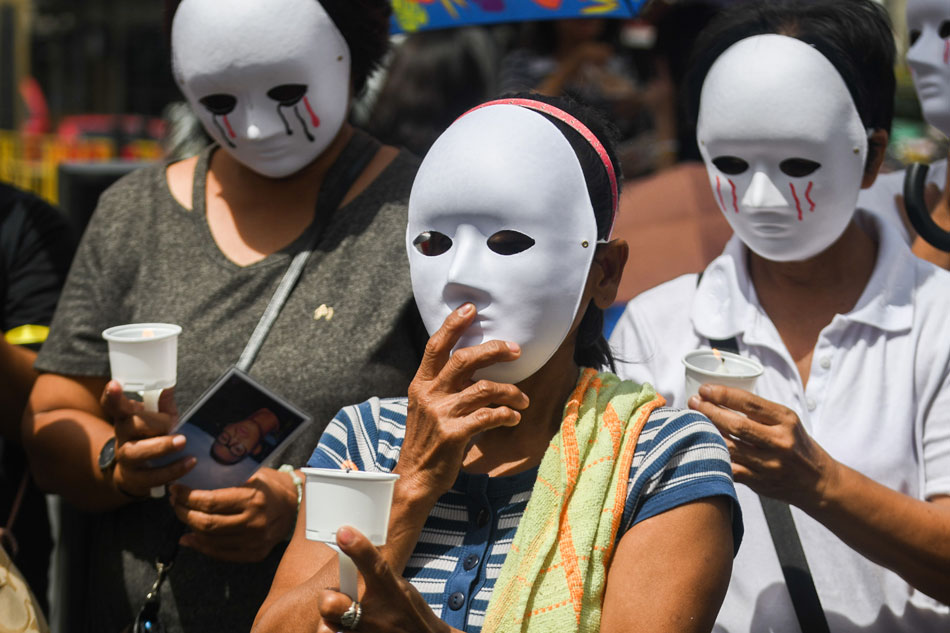Philippines rejects 'faulty conclusions' in UN rights report | ABS-CBN
ADVERTISEMENT

Welcome, Kapamilya! We use cookies to improve your browsing experience. Continuing to use this site means you agree to our use of cookies. Tell me more!
Philippines rejects 'faulty conclusions' in UN rights report
Philippines rejects 'faulty conclusions' in UN rights report
Davinci Maru,
ABS-CBN News
Published Jun 06, 2020 10:36 AM PHT
MANILA – Malacañang on Saturday dismissed claims made by the United Nations rights office over alleged violations and abuses in the Philippines, saying they were premised on “faulty conclusions.”
MANILA – Malacañang on Saturday dismissed claims made by the United Nations rights office over alleged violations and abuses in the Philippines, saying they were premised on “faulty conclusions.”
In his latest statement, presidential spokesperson Harry Roque said there was no truth to the accusations made by the United Nations Office of the High Commissioner on Human Rights (OHCHR) that the government was clamping down legitimate dissent and was responsible for the supposed widespread killings of drug suspects.
In his latest statement, presidential spokesperson Harry Roque said there was no truth to the accusations made by the United Nations Office of the High Commissioner on Human Rights (OHCHR) that the government was clamping down legitimate dissent and was responsible for the supposed widespread killings of drug suspects.
“The Philippine government notes the recommendations made by the OHCHR, but cannot commit to their full implementation given the faulty conclusions on which they were premised,” he said.
“The Philippine government notes the recommendations made by the OHCHR, but cannot commit to their full implementation given the faulty conclusions on which they were premised,” he said.
“Among them the alleged violations of the right to life, the supposedly arbitrary deprivation of liberty of those involved in drug cases, the alleged violations of the right to health, and the implication that Filipino civic space is being destroyed by the focus given to public order and national security. We firmly reject these conclusion,” said Roque, in a second statement he issued on the UN report after calling its findings "rehashed claims of impunity" that he described as "unfounded" on Friday.
“Among them the alleged violations of the right to life, the supposedly arbitrary deprivation of liberty of those involved in drug cases, the alleged violations of the right to health, and the implication that Filipino civic space is being destroyed by the focus given to public order and national security. We firmly reject these conclusion,” said Roque, in a second statement he issued on the UN report after calling its findings "rehashed claims of impunity" that he described as "unfounded" on Friday.
ADVERTISEMENT
The Palace maintained that the Philippine government continues to uphold the rule of law, abides by due process and respects its international obligations.
The Palace maintained that the Philippine government continues to uphold the rule of law, abides by due process and respects its international obligations.
In its report, the UN rights office said the Philippine government’s drug war has led to serious human rights violations, including the killing of more than 8,600 suspects.
In its report, the UN rights office said the Philippine government’s drug war has led to serious human rights violations, including the killing of more than 8,600 suspects.
"There has been near impunity for these killings, with only one conviction for the killing of a drug suspect in a police operation since mid-2016," it said.
"There has been near impunity for these killings, with only one conviction for the killing of a drug suspect in a police operation since mid-2016," it said.
The OHCHR also raised concerns that dissenters, critics and media were vilified, threatened or arrested, with some being associated with communists or terrorists.
The OHCHR also raised concerns that dissenters, critics and media were vilified, threatened or arrested, with some being associated with communists or terrorists.
The report was crafted based on 893 written submissions, inputs from the Philippine government, analysis of various documents and material, as well as interviews with victims and witnesses.
The report was crafted based on 893 written submissions, inputs from the Philippine government, analysis of various documents and material, as well as interviews with victims and witnesses.
However, Malacañang said the government’s anti-narcotics campaign had the support of the public due to President Rodrigo Duterte’s campaign promise of ridding communities of drugs.
However, Malacañang said the government’s anti-narcotics campaign had the support of the public due to President Rodrigo Duterte’s campaign promise of ridding communities of drugs.
“The OHCHR’s conclusions regarding the supposed crackdown on critical advocates is belied by its own findings that the ‘Philippines has a long-standing, robust tradition of human rights advocacy and civil society activism, with 60,000 registered non-governmental organizations,’” Roque, a human rights lawyer, said.
“The OHCHR’s conclusions regarding the supposed crackdown on critical advocates is belied by its own findings that the ‘Philippines has a long-standing, robust tradition of human rights advocacy and civil society activism, with 60,000 registered non-governmental organizations,’” Roque, a human rights lawyer, said.
Read More:
Philippines human rights
United Nations human rights
Harry Roque UN report
Palace UN report
OHCHR Philippines report
ADVERTISEMENT
ADVERTISEMENT



